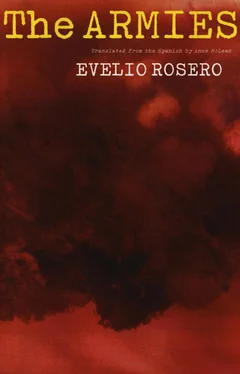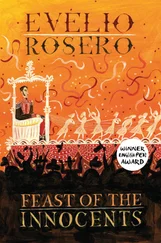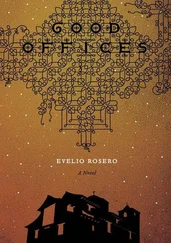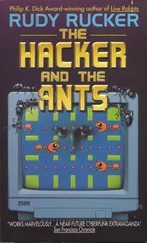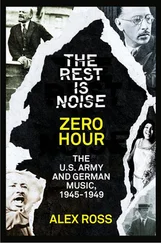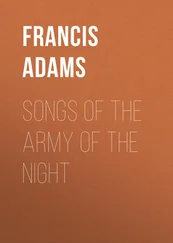The glass door is wide open.
“Is there anyone here?” I ask. “Otilia, are you here?”
Something or someone moves behind me: I turn to look with my heart in my mouth. Our two hens are sheltering in the Brazilian’s garden, as indifferent as they are extraordinary, luckier than the macaws; they peck patiently around the ground. They remind me of Maestro Claudino, of my promise.
I find Geraldina in the living room where I’d spoken to her not long before. She is still sitting in the same armchair, still dressed in black, still sunk in her sorrow, in a shadow of love made more all-encompassing, urgent and devastating than ever by sadness. Her hands in her lap, her eyes gone, a tall icon of suffering. Probably because it is dusk, and because it is war, the same deep darkness of this day surrounds everything more forcefully. I find other sitting spectres around Geraldina; women chanting the rosary, their voices plead and answer in whispers. I interrupt the prayer. They ignore me. In vain I search for Otilia’s face among them. I feel sorry for myself: if Otilia was praying with them she would already have come to meet me.
“And Otilia?” I ask in spite of everything.
They continue their muttered praying.
“She was here, sir,” Geraldina’s emotionless voice says to me. “She was here, and she left again.”
I have returned to my house again, by the same route. I start to make coffee in the kitchen, and stay there, sitting, waiting for the water to boil in the pot. I listen to the water boiling, and remain still. The water evaporates completely, the pot burns; the thin strip of smoke rises up from the bottom of it and reminds me of the burnt tree, the dead body of the cat. Well, I was unable to make coffee; I turn off the stove, what time is it? How much time has passed? I do not hear anymore shooting. How will time pass, my time, from now on? The din of the war disappears: now and then a distant lament, which seems almost not to belong to us, a call, a shouted name, any name, running footsteps, indistinct noises that fade and are replaced by absolute silence. Night is falling, shadows begin to hang everywhere, I can see nothing but myself. I try again to make coffee: I hold the small pot under the tap. All of a sudden there is no water, or electricity; you have wasted your chance to make coffee, Ismael, and who knows when the water and power will come back on? What would Otilia do in my position? She would fill the pot with water from the fountain, light the coal stove, she would ennoble the world, offering us coffee in the midst of catastrophe; I sit still, night arrives in full and I hear that someone is speaking out in the street, through a megaphone.
We are asked to bring any wounded out immediately, otherwise to remain inside our houses until the situation is stabilized, that is what the impersonal voice says through the megaphone:
“… until this situation is stabilized. We have succeeded in driving back the bandits.”
I hear, as the only reply, a moan from inside the house. Cristina , I say to myself. Her name is the only thing that shakes me from this deathlike paralysis into which I have sunk. I look in the kitchen drawers for a candle to light. I do not find one. I have to feel my way through my own house; I go to my room — the room Otilia and I share with that old wooden Saint Anthony, a sort of altar where the candles and matches are kept. The moan sounds again in the darkness; it has to be the girl, but she is not in the room. My hands tremble, light the candle with difficulty. With this flame I go through the house searching, calling Cristina.
I discover that she has gone into the room that used to be our daughter’s, where I have not been for years — only Otilia goes in there, to pray for us.
“Here we will be closer to our daughter,” she said.
“Cristina,” I call out loudly. “Are you injured?”
“No,” she answers at last, coming out from under the bed. With all that has happened and the unfortunate circumstanccs I deplore my own self, detesting myself for noticing, voluntarily or involuntarily, the bunched up dress, the pale birdlike thighs, the wild darkness between her legs, in the faint candlelight, her face wet with tears.
“What about my mom?” she asks again in terror.
She hugs an old teddy bear that used to belong to my daughter. She is a little girl: she could be my granddaughter.
“If you want, go out and look for her,” I say. “And if you want to come back, come back, and if you don’t want to, don’t come back, but stop crying.”
“How?” she managed to reply. “The tears just come out.”
“This is no time to cry, Cristina. I’m not telling you to laugh, I’m just saying we have to gather our strength to find those we are looking for. If you cry, your tears weaken us.”
I tell myself the same thing.
And I hear her leave the house, slam the door shut, run out into the night, the night that must stand just like the street: empty. I have stayed sitting on my daughter’s bed, the candle in my hand, feeling the wax drip over my hands, the wick I extinguish with my fingers, smelling my own charred flesh, until dawn breaks. You have not returned, Otilia, not sooner and not later. I shall have to look for you again, but where, where did you go to look for me?
I hear birdsong — they sing in spite of everything. The garden appears to my eyes to be divided by gauzes of light, it is a haggard dawn, I hear the surviving cats meowing in the kitchen. I do what Otilia would do: I feed them bread and milk, and I eat the same thing, I am your other cat, I think, and in thinking it I remember the dead cat: I will have to bury that cat, so you shall never see your cat dead, Otilia. I go to the tree: the mangled cat is still there; I bury him under the same tree. Maestro Claudino’s hut is the last place left, the last place you could have gone looking for me, Otilia, I told you myself I planned to take the Maestro a chicken; there you are, I shall find you there, and so there I go, repeating it to myself with all the force and stubbornness of a light in the middle of the fog that men call hope.
But first I go and look for and chase — in the Brazilian’s garden — one of the hens, my hens, who have decided to keep on living in the neighbors’ garden. I am aware of Geraldina’s eyes watching me through the glass door, Geraldina dressed in mourning watches me in shock as I catch a hen at last and stuff it into a shoulder bag, laughing now: we shall have a chicken stew, Otilia, Maestro Claudino and I. Through the hole in the wall I return to my house, forgetting to wave to Geraldina, without saying goodbye. As I walk down the first empty streets I forget the war entirely: I feel only the warmth of the hen against my side, I believe only in the hen, its miracle, Maestro Claudino, Otilia, the dog, in the hut, all focused on the happy stew in the pot, far from the world and further still: on the blue invulnerable mountain in front of me, half hidden in the veils of fog.
The last house, on the paved street, just before the beginning of the highway, is Gloria Dorado’s. Small, but big enough, clean, mango trees in the yard, it was a gift from Marcos Saldarriaga. I thought I saw Gloria for a second, standing at the open door, in white pyjamas, with a broom in her hand: she was going to say something to me, I thought, but she closed the door. She was going to say good morning and changed her mind and rightly so, I suppose, when she saw me laughing to myself, very discordant to the anguish with which she has lived since the disappearance of Saldarriaga. I have started off down the road when I hear her voice behind me, the voice of Gloria Dorado, the strange blue-eyed, brown-skinned woman Saldarriaga was devoted to.
Читать дальше
